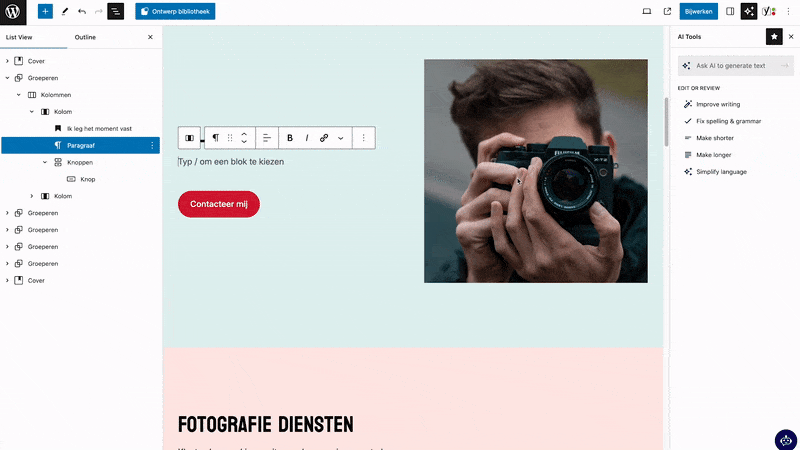WordPress.com vs WordPress.org: here’s the difference

You want to start using WordPress, but suddenly you realize there are two options: WordPress.com and WordPress.org. Confusing, right? So, what’s the big difference between the two, and more importantly, which one do you need?
What is WordPress?
WordPress is by far the most popular Content Management System (CMS) available. A CMS allows you to easily create and manage your own website. It’s a tool that helps you manage and create content on your site.
WordPress has a user-friendly control panel where you can manage everything. You can handle everything directly in your browser, without needing to download any additional software. Think of WordPress as a control room for running your website or online store.
Free to use
The biggest advantage of WordPress is that the platform itself is completely free: you don’t have to pay anything for the CMS. Plus, there are plenty of free WordPress themes and plugins available that can add a lot of extra functionality to your website.
You absolutely don’t need to write any code, nor do you need extensive technical knowledge or training. Instead, you use WordPress's easy-to-use interface to create pages, posts, text, and images: the CMS handles the coding for you.

The fact that WordPress is free to use is, of course, a huge benefit. However, you will need hosting (web space) to store your website and a domain name to make it accessible.
Also read
Open Source
WordPress is constantly being improved by its large community: this is what we call *Open Source* software. This means that everyone has access to the code behind WordPress. The large WordPress community continuously creates new themes and plugins (extensions), which are often free to use.
Even though WordPress itself is Open Source, as a user, you don’t need any coding or programming knowledge. Of course, it’s always helpful to have a basic understanding, but even without it, you can easily build a WordPress website. 😉
Easy to use
You don’t need to download WordPress: when you choose WordPress hosting, WordPress is already installed on your hosting package.
Once set up, you can easily add text, images, and other elements to your site, and publish your first post or page in no time. In other words, it's so easy that even a beginner can handle it!
If you need more technical freedom and the ability to make complex customizations, you can opt for self-hosted WordPress, which offers greater control over hosting options and maintenance. More on that shortly!
Let AI build your WordPress website
Artificial Intelligence (AI) is far more than just a fun gimmick. When used properly, it can make your life significantly easier. That's exactly how we see it here at Combell. So, we thought: what if we integrate AI into our WordPress Site Assistant?
The Site Assistant already helps you build your own WordPress website. You tell it what you need, and the Site Assistant handles the rest. This handy tool adds features, offers design suggestions, and uploads the right WordPress plugins for you. It couldn’t be easier. You’ll hardly have to build or tweak your website or online store yourself!

... and write your content!
In addition, our Managed WordPress AI Assistant helps you quickly fill your website with relevant content.
Convenient! You may be an expert in your field and can talk about your passion for hours, but have no idea how to put it all into words—especially on your website’s pages. If you’re unsure where to begin, you won’t need to stare at a blank page. The AI tool in Site Assistant writes your website content for you. This way, you don’t need to outsource the content creation, saving you a lot of money!
Now that you understand what WordPress is for, great! You're probably eager to get started. But when you begin searching, you come across both WordPress.org and WordPress.com. "And this is supposed to be a super handy, inventive tool?" you might think. Fortunately, there’s a clear and logical difference between WordPress.com and WordPress.org.
What is WordPress.org?
WordPress.org provides the WordPress software. It’s essentially the headquarters of WordPress. With this software, you can build a fully functional WordPress website.
You can't create a website directly on WordPress.org; you need hosting and a domain name for that. If you choose WordPress hosting from Combell, your website or webshop will run on the software available at WordPress.org.

Advantages of WordPress.org:
The WordPress software is Open Source, which means you can download and use it for free. Its user-friendliness remains one of WordPress's key strengths, although there is a learning curve for beginners.
Since you host the WordPress installation yourself, you have full control over your website and the data on it. This also means you're responsible for securing, updating, and maintaining that data.
You can use any plugin or theme you want, including e-commerce plugins like WooCommerce. An e-commerce package such as the WooCommerce plugin offers specific features for setting up an online store, like international payment options and integration with shipping companies. Thanks to WordPress’s flexibility, you can integrate the software with countless plugins and themes—one of the reasons WordPress is so popular.
Tip
Create a professional WordPress webshop using WooCommerce.
WordPress offers thousands of themes, each with its own level of quality and functionality. The best themes are often premium, meaning they require purchase. This is also true for premium plugins.
Looking to make money with your WordPress webshop? The software allows you to integrate platforms like Google AdSense, as well as other ad networks.
You have full control over which analytics tools and tracking methods to use, whether it's Google Analytics or more privacy-focused alternatives like iubenda.
You can use SEO plugins such as Yoast SEO or Rank Math to optimize your website for search engines. This is crucial, as higher rankings can lead to increased organic traffic.
Disadvantages of WordPress.org:
In addition to the WordPress software, you’ll need hosting. Fortunately, hosting packages come in all shapes and sizes. At Combell, we offer packages that perfectly match the needs of your website or webshop.
You're responsible for managing updates and backups. While more hosting providers are now offering these services, it’s something to be aware of. With our "100% WordPress, 0% hassle"Managed WordPress Hosting, we take care of all maintenance and updates for you as your hosting provider! This package also includes our Site Assistant.
It’s up to you to keep your website secure by combating spam and implementing proper security measures. Combell always keeps a close eye on things, particularly through our Combell Shield. We’d be happy to explain how it works!
What is WordPress.com?
WordPress.com is primarily a blogging platform where you can build and maintain a free website. However, with the free version, you’ll quickly encounter limitations in terms of customization. Websites using WordPress.com can often be identified by the ".wordpress.com" URL in the address bar.
Tip
If you've registered a domain name with Combell, you can set up masked forwarding to direct visitors to your free WordPress.com blog using your custom domain.

Advantages of WordPress.com:
WordPress.com provides a free blog with 3GB of storage, which is more than enough for a simple personal or hobby blog. If you run out of space, you can purchase additional storage.
WordPress.com handles all the technical aspects, such as installation, maintenance, and updates. This allows users to focus solely on creating content without having to worry about any technical details.
The platform automatically backs up your site. This is a significant advantage for users who don’t want to manage the technical side of their blog, like setting up backup systems.
Disadvantages of WordPress.com
WordPress.com offers various paid plans that differ in price and functionality. These plans provide more storage, advanced SEO tools, the ability to install premium themes and plugins (available with higher-tier plans), and support. As a result, the free plan has quite a few limitations.
In exchange for the free plan, WordPress.com places ads on your blog, over which you have no control and from which you don’t earn any revenue. These ads are usually removed in paid plans like the Personal plan and above.
With the free and lower-tier paid plans, you cannot upload custom themes or plugins. Only with the Business plan or higher can you use your own plugins and themes.
In the lower-tier plans, you can only use the built-in WordPress.com statistics. To access external analytics tools like Google Analytics, you’ll need to upgrade to at least the Business plan.
You are never the full owner of your website, as everything remains under WordPress.com's control. If you violate their terms of service, WordPress.com can delete your blog without warning.
Since your site runs on WordPress.com, visitors will always see a "yoursite.wordpress.com" URL in their address bar. While this might not bother you, such a URL doesn’t look very professional. Using your own domain name is always better.
If you choose a free or low-cost plan, you’ll have to accept the “Powered by WordPress.com” message displayed on your site. This can only be removed by upgrading to a more expensive plan.
WordPress.com users do not have FTP access, meaning you don’t have direct access to your site’s files.
A self-hosted WordPress.org site offers more flexibility for SEO optimization. While WordPress.com sites can still perform well in search engines, especially with the built-in SEO tools available in higher plans, advanced SEO customizations are limited compared to what you can achieve with WordPress.org.

WordPress.org vs. WordPress.com: the difference
WordPress.org is the official website of WordPress, where you can download the installation files for free and install them on your own server or web hosting. It also provides free themes and plugins to extend the core functionality, as well as forums for community support.
WordPress.com, created by the founders of WordPress.org, is a platform where the WordPress software is already installed. Anyone can start their own (free) blog without needing any technical expertise. It’s a hosted service, meaning you don’t need to handle software installation or maintenance — you can start right away.
For advanced features like full e-commerce capabilities, more storage, and access to premium themes and plugins, you’ll need to upgrade to one of the paid plans. These plans offer more flexibility but still don’t provide the same level of control you get with a self-hosted WordPress.org site.
Tip
Want to migrate from WordPress.com to WordPress.org? While it’s not the simplest process, there are ways to make it happen. Check the support pages on WordPress for guidance.
Which tool do you need?
WordPress.org or WordPress.com—it’s your choice! If you’re looking for a basic site with known limitations and don’t mind third-party ads being placed on your (free) site, then WordPress.com might be right for you, whether or not it’s linked to your domain name.
But if you want to take a more professional approach, perhaps to launch your own business or showcase an online portfolio, we highly recommend WordPress.org. With it, your site or shop can have a unique design, and you have full control over every aspect of your WordPress environment, including plugins.
For those starting an e-commerce business, WordPress.org software is an even better fit. No third-party ads, no restrictions, and complete freedom to expand your WordPress webshop as you wish. Go big online!
From hobbyists to big businesses: everyone uses WordPress!
In fact, you’re visiting one right now—our blog runs on WordPress because it’s the easiest way to create posts. And we’re in good company: even the White House, the official website of the President of the United States, uses WordPress.
Recognizing WordPress websites is quite challenging. You’ll see this when comparing the White House’s website to ours, or to the website of The Rolling Stones: all built with WordPress, but they don’t look alike at all.
That’s thanks to the diverse range of WordPress themes! Building a WordPress site doesn’t mean yours will look like a dozen others—you can fully design it to match your style.


